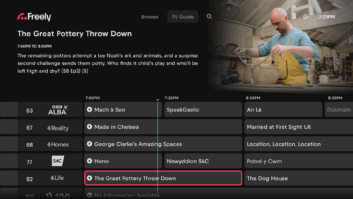A House of Lords committee has accused the UK government of setting out its plans to privatise Channel 4 too quickly, and says ministers should have waited on consulting on the broadcaster’s future until after setting out a vision for public service broadcasting.
A report published by the House of Lords Communications and Digital Committee states that the debate over the future of the broadcaster has been “a binary one” between privatisation or the status quo.
“It should instead start by establishing our ambitions for Channel 4 before considering how best they can be realised,” it adds.
The committee’s report also says risks and opportunities of both privatisation and continued state ownership must be weighed up, while much will depend on how willing the government is to protect Channel 4’s public service remit and its contribution to the creative industries as part of any potential sale.
The committee was also unhappy at Channel 4’s own response to the consultation, saying it was “surprised” that in both written and oral evidence when asked to describe any potential benefits of privatisation alongside potential risks, the broadcaster “described only risks”.
“When asked about the potential benefits of privatisation, Channel 4 Corporation’s response listed only potential disadvantages. We would have been more reassured to see C4C, as a publicly owned corporation, openly demonstrate that the potential benefits of privatisation had been considered by its board,” the report continued.
The report says that privatisation’s main benefit would be increased investment in programming, content partnerships and technology through access to capital, enabling Channel 4 to diversify its revenues, enhance its sustainability and be more ambitious internationally. However, privatisation is not the only way in which Channel 4 could access capital, it argues.
The committee recommends that, regardless of ownership, Channel 4’s role in supporting small, medium, diverse and regional production companies should be strengthened, while ensuring that the interests of large, established production companies do not take precedence over the channel’s sustainability.
Lord Gilbert, chair of the committee, said: “It is difficult to reach a conclusive view on the ownership of Channel 4 without understanding the future public service broadcasting landscape.
“We are not convinced by claims that privatisation is an urgent necessity nor by warnings that it would be a catastrophe for viewers and independent producers.
“We welcome the government’s and Channel 4’s sincerity in seeking the strongest future for the brand. However, the board of Channel 4 should be open to all possibilities for achieving this, including privatisation. Likewise, it would be remiss of the government not to consider possible reforms which might make Channel 4 more sustainable without a change of ownership,” it added.
“The government’s upcoming White Paper must justify its decision on Channel 4’s ownership in relation to a clear and compelling vision for the future of public service broadcasting.”






